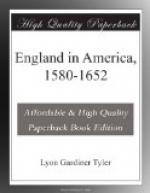The conference instead of quieting aggravated the difficulty. Five days later, when Mr. Wheelwright’s name was voted upon, Winthrop rose and hotly objected to him on the ground that he held unorthodox opinions respecting the indwelling of the Holy Ghost and was apt to raise “doubtful disputations.” As a consequence the church would not elect Wheelwright in the face of an objection from so prominent a member as Winthrop. Next day Winthrop continued his attack, insisting that Wheelwright must necessarily believe in a “personal union.”
At this juncture Governor Harry Vane unfortunately gave to the existing difficulties a political aspect. Vane was the son of one of the secretaries of state of England. Having taken a religious turn, he forsook all the honors and preferments of the court and obtained the consent of his parents to visit Massachusetts. Almost immediately after his arrival, he was elected, in May, 1636, when only twenty-four years of age, governor of the colony, with John Winthrop as deputy governor. After the quarrel in regard to the election of Wheelwright, Vane, who had become tired of the distractions in the colony, convened the general court, December 10, 1636, to tender his resignation upon the half-reason that his private affairs required his presence in England.
Next day one of the assistants very feelingly regretted the coming loss, especially in view of threatened attacks from the French and Indians. The remarks took Vane off his guard. Carried away by his feelings, he burst into tears and protested that, though his outward estate was really in peril, yet he would not have thought of deserting them at this crisis had he not felt the inevitable danger of God’s judgments upon them for their dissensions. Thereupon the court, of which a majority were his opponents, declined to allow his departure on the grounds assigned. Vane saw his mistake and reverted to his private estate. The court then consented to his departure, and a court of elections was called for December 15 to supply the vacancy caused by his resignation.
Before this time arrived the religious drama took a new turn. The friends of Mrs. Hutchinson knew the value of having the head of the government with them, and would not dismiss Vane from the church, whereupon he withdrew his resignation altogether. Till the next election in May the colony was more divided than ever. Mr. Wheelwright was appointed to take charge of a church at Mount Wollaston, but his forced withdrawal from Boston was a source of irritation to his numerous friends. Mrs. Hutchinson remained and was the storm-centre, while Vane, who now sought a re-election, was freely accused of subterfuge and deception.
A day or two after December 15 the ministers and the court held a meeting at which very hot words passed between Governor Vane and Rev. Hugh Peter. Wilson, the pastor of Boston, also indulged in caustic criticisms directed at Governor Vane and the other friends of Mrs. Hutchinson. By this speech Wilson gave great offence to his congregation, who would have laid a formal church censure upon him had not Cotton interfered and in lieu of it gave his fellow-preacher a good scolding, under the guise of what Winthrop calls “a grave exhortation.”




